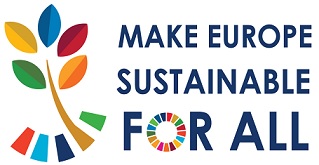| Europe is facing in recent years powerful challenges that threaten its remarkable effort at continental fraternal unity, harassed and beset by extremist movements, uncontrolled immigration, separatist tendencies (such as the Brexit) and, finally, the disastrous Covid pandemic. It is timely and advisable to disseminate the efforts that continue to be made to promote harmonious sustainability based on participatory democracy, especially so that this peace-promoting example spreads to other continents. | Europa está enfrentando en los últimos años poderosos desafíos que amenazan su notable esfuerzo de fraternal unidad continental, hostigada y acosada por movimientos extremistas, inmigración descontrolada, tendencias separatistas (como el Brexit) y, finalmente, la desastrosa pandemia. Es oportuno y aconsejable divulgar los esfuerzos que se siguen haciendo para promover una armoniosa sustentabilidad basada en la democracia participativa, sobre todo para que ese ejemplo promotor de la paz se propague a otros continentes. |
 The priorities and recommendations of EU Civil Society organisations were presented in the 545th plenary session of the European Economic and Social Committee on the 18th July 2019. Conny Reuter, SOLIDAR Secretary General and co-chair of the Civil Society Liaison Group, presented the Recommendations for the EU Institutions resulted from the 2019 of the EESC Civil Society Days, titled Sustainable Democracy in Europe, that took place on the 12th and 13th June 2019. The two days’ event, held two weeks after the European elections, in its two plenary sessions and six workshops focusing on the key issues, analysed the sustainability of our democratic system from several viewpoints and came up with recommendations for transforming our system into a more sustainable and thus resilient one.
The priorities and recommendations of EU Civil Society organisations were presented in the 545th plenary session of the European Economic and Social Committee on the 18th July 2019. Conny Reuter, SOLIDAR Secretary General and co-chair of the Civil Society Liaison Group, presented the Recommendations for the EU Institutions resulted from the 2019 of the EESC Civil Society Days, titled Sustainable Democracy in Europe, that took place on the 12th and 13th June 2019. The two days’ event, held two weeks after the European elections, in its two plenary sessions and six workshops focusing on the key issues, analysed the sustainability of our democratic system from several viewpoints and came up with recommendations for transforming our system into a more sustainable and thus resilient one.
The days brought together 16 European Networks, members of the EESC Civil Society Liaison Group, together with members and representatives of the EESC and around 300 citizens across Europe, with backgrounds in civil society, policymaking, business and education. Participants stressed that at this crucial moment for Europe there is an urgency to build a real sustainable, green, fair and social EU (green, fair, social) based on participatory democracy.
The challenges Europe is facing today are unprecedented. A rise in nationalism, driven by a loss of citizens' faith in the European project, is threatening to overturn democratic values and undermine social and political stability. At the same time, the scale of the environmental crisis, with the climate emergency and unparalleled biodiversity loss, points to a systemic failure of the underlying predominant economic model.
The legitimate concerns over climate change and the environment on the one hand, and democratic values on the other, were at the top of the agenda of many voters in the recent European elections. The outcome of these elections, to some extent, is a direct translation of the urgency felt among many European citizens, in particular the youth. These voters point to the urgency of addressing our numerous economic, social, environmental and political challenges.
Firstly, this key civil society conference called on European institutions to enhance participatory processes and strive for a real Participatory Democracy.
In order to achieve a sustainable democracy, its participatory dimension must be enhanced, citizens must be empowered and civil society organisations (CSOs) must be protected. Institutions therefore have to take an unambiguous stance against stigmatisation and criminalisation of civil society and support its different actors that stand and act for democratic values and fundamental rights both at grassroots and at transnational level. MEPs should work to empower citizens, especially young people, and the civil dialogue has to be implemented centrally and peripherally as per art 11(1) and art 11(2) TEU.
The actions proposed have the aim to bridge the gap that currently stands between citizens and their representatives by making the decision-making process more accessible and inclusive.
Secondly, the Civil Society Networks suggested action for a real change towards building a sustainable Europe: climate-neutral and green, fair and social, strong and economically vibrant. This would require a paradigm shift and a systemic approach to address today's unprecedented challenges. Sustainable Development, seen as a people-centred project with an economy that works for society to deliver prosperity and an environment that provides quality of life, must be at the heart of the future of Europe.
The future European economic model must be centred on social and environmental justice to achieve a sustainable democracy. By accomplishing this shift, elements like quality of employment, social protection and social equality are essential and need therefore to be protected and enhanced. Moreover, good practices such as democracy at work should be enhanced and supported as they have a beneficial impact on civic democracy, economic performance, the reduction of inequalities, sustainability, and job quality.
[ Recommendations ]
[ Conference on the Future of Europe ]
[ Joint Civil Society Declaration ]
Comments powered by CComment